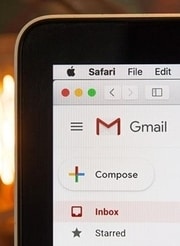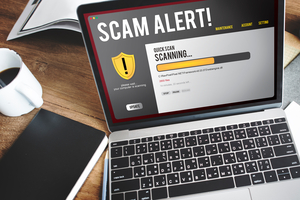Even though WhatsApp, Facebook Messenger, Instagram, and Snapchat among others are the go-to social media platforms for instant communications, we still heavily rely on emails even in 2020. So why does there seem to be little focus on ways to protect our email privacy?
Afterall, we use emails to share our financial information with our accountants, manage online money transfer services like PayPal, and even use it to create all of our social media accounts. In a sense, our personal lives are linked to our email addresses.
Despite being such a major part of our life and the fact that approximately 320 billion people are using it, email remains as one of the least secure means of communication. Believe it or not, email technology is still based on protocols that can’t cope up with modern online security threats.
Getting your email hacked might not seem like a big deal for kids, but for adults, it can be an absolute nightmare.
Keeping this in mind, in today’s informative blog post, I’m going to talk about why email privacy is so important, share with you some real-world email hacking case studies, and also tell you 9 proven tips to enhance your email privacy.
Why Email Privacy Matters?
Think about it for a second, everything you do online is connected to your email address. Whether it be online banking or something as simple as signing up for any online service, you’ll have to provide an email address to get started. Once you get registered, you usually get your account details such as username and password emailed back to you.
If a hacker gains access to your emails, all hell can break loose. About 92% of malware is delivered through emails. That’s an alarming figure.
If a hacker gains access to your account, they can obtain sensitive information such as account credentials, personal information, and even steal your identity.
Now you must be thinking, how on earth can someone read my emails when no one knows my password?
Well, unlike the messages we send over WhatApp and other end-to-end encrypted messaging services, emails go through numerous servers before reaching their destination.
Whenever an email passes through an intermediary server, multiple copies of it are stored. While one server might be difficult to hack, others might not be. That’s how your emails get compromised.
Think I’m making this up?
Well, you can enter your email address on haveibeenpwned.com and check whether anyone has compromised your privacy.
Anyways, if you still have doubts, let’s check out some real-world use cases where people have actually lost a ton of money simply because their email addresses got hacked.
Real-World Email Hacking Cases
I’m going to share with you two actual cases that resulted in the loss of thousands of dollars simply because some hackers managed to gain access to the email accounts of unsuspected victims.
Case #1 – $47,500 Stolen From a Pensioner
A pensioner in Brisbane Australia bore a loss of $47,500 when he became a victim of an identity theft case. A hacker managed to hack into the victim’s account and send a series of convincing emails to the advisor managing his pension funds.
The hacker requested to deposit $90,000 to an overseas bank account as his daughter desperately needed money. The advisor got convinced and sent over a Pension Payment Request form telling the hacker that only $47,500 can be withdrawn.
The hacker filled in the form with all the details stolen from the client’s email account and told the adviser not to call him as he’s attending a funeral.
The advisor respected the client’s request thinking it was genuine and processed the withdrawal request right away. Till the real client could manage to explain that his email account got hacked a few days ago, the funds were already transferred to an offshore account.
Case #2 – Barely Dodged an Email Fraud of $260,000
Another financial adviser based in Australia was also targeted by a hacker, however, she managed to dodge a fraud of $260,000.
A hacker emailed her from her client’s email address that got hacked, requesting her to change the email address to a new one. The new email address only had one letter missing — “g”.
The hacker then sent an email from the new email account telling the advisor to deposit $260,000 in an offshore account because they wanted to buy some property. The email seemed totally legit, however, since the amount was quite substantial, the advisor wanted to talk to the client personally for authenticity reasons.
However, the real client was unreachable over the phone, and the transaction got delayed. In desperation, the hacker contacted the adviser via a phony contact number that was associated with the new bogus email address.
However, upon getting in contact, the adviser quickly figured out that the person on the phone was not the real customer judging from the accent, and refused to process the request.
9 Tips to Enhance Your Email Privacy
So by now, you must have an idea of how a hacker can take over your life if your email address gets compromised. But it’s not the end of the world. Now, we’re going to look at 9 proven easy tips to enhance the privacy of your email accounts.
Tip #1 – Use More Than One Email Address
You should never rely on just a single email account for work and personal use. Always use two different email accounts to segregate your work mailbox from your personal mailbox. This will ensure that you’re not putting all your eggs in the same basket.
If you want to take this strategy to another level, you can create different disposable email addresses when signing up for any service online. This way, you’ll never risk your personal information.
Tip #2 – Use Strong Passwords
Probably the most basic reason why most people lose their email accounts is that they use weak passwords. Passwords like your name followed by a sequence of numbers (John12345678) are really easy to crack.
With your password compromised, a hacker can freely go through your emails, piece your personal information together, and then wreak all sorts of havoc.
An easy solution to this problem is to use strong lengthy cryptic passwords. Use a lot of uppercase and lowercase letters along with numbers and special symbols to make your password uncrackable. A password like this: !.v[L2,m=nVhpPJ<:Ub<gQ5A, would be impossible to compromise.
Tip #3 – Don’t Share Your Email When You Don’t Have to
This seems pretty self-explanatory, however, you’re often going to find people linking their email addresses in their social media bios. We’re all guilty of it. Another mistake that we all make is that we tend to provide our real email address when signing up for services that don’t really require email confirmations.
By limiting where we share our email address, we can prevent hackers who are constantly on the lookout for new victims from compromising our email account’s privacy.
Tip #4 – Enable Two-Factor authentication
In addition to using an insanely strong password, it’s often a good idea to use two-factor authentication (2FA). Two-factor authentication ensures that if your password gets compromised, an attacker will still be required to bypass the second layer of security.
Depending on which version of two-factor authentication your email client offers, an attacker will be required to either enter an email address on a secondary device, enter a pin received via SMS or answer a secret question for reinforced privacy.
Since emails are relatively easier to hack and compromise, you should never share any personally identifiable information such as social security numbers, phone numbers, date of birth, and other sensitive data. This will ensure that you’re not providing any information that can come back to haunt you in the future. Another available resource where you can check if your data is exposed is from CyberNews and their data leak checker. It covers the latest leaks from LinkedIn or Clubhouse, just to name two.
Tip #6 – Use a Secure and Authentic Email Client
If you want to be completely sure that no will be able to read the contents of your emails, you’ll have to ditch mainstream email clients like Gmail for something that’s not generic and actually offers any privacy.
You can go for something like ProtonMail, who have their servers buried 1,000 meters underground in a Swiss bunker. Other noteworthy email clients include Posteo, Mailfence, and mailbox.org.
Tip #7 – Sign Out of Your Mailbox as Often as You Can
This might seem like a cumbersome process, but it can actually enhance the privacy of your email account. Signing out whenever you’re not using your email account can prevent remote hijackers from examining the contents of your mailbox.
Now, I’m not suggesting that you log out of your account every time you’re done emailing someone. Instead, sign out of your email account at the end of your work shift or before going to bed. Especially if you’re using someone else’s computer.
Tip #8 – Don’t Use Public Wi-Fi
No matter how tempting a free Wi-Fi connection might seem, you should never use one for any sensitive task. Hackers are infamous for setting up malicious hotspots to intercept people’s personal information.
So, if you log into your email account via a malicious Wi-Fi connection, a hacker can potentially take over your email account and steal your sensitive information. This is why you should always use only trusted networks or use a Proxy if connecting to public Wi-Fi is the last option available to you.
Tip #9 – Use a Recovery Email Address
The last and final tip I have for you is to always set up a recovery email address in case something goes wrong. This way, if someone manages to take over your account and exploits you, then you can simply change your password via the recovery backup email address and regain control of your email account.
Wrapping up!
So this wraps it up. I hope you now have an idea of why you should start taking the privacy of your email accounts seriously. If you religiously start following the 9 tips I shared with you in this blog post, you can greatly enhance the privacy of your email account.
After all, it all comes down to you. You’re the only one who can put in the effort to and safeguard the privacy of your email account. If you found this blog post informative, do consider sharing it with your friends and family.
Read more about how to protect your email privacy by preventing identity theft through phishing emails. You can also make the internet more safe by reporting phishing.









 Explore the Safe Search Engine -
Explore the Safe Search Engine -